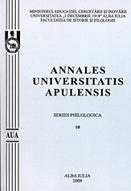Prototipuri şi expresivitate în textul narativ. Aplicaţie la nuvela Golanii de Liviu Rebreanu
Prototypes and expressiveness in the narrative text. Case-study of the short-story “The Scum” by Liviu Rebreanu
Author(s): Ioan MilicăSubject(s): Language and Literature Studies
Published by: Universitatea »1 Decembrie 1918« Alba Iulia
Keywords: linguistic relativity; reception theory; cognitivism; prototype; expressiveness
Summary/Abstract: The study aims at arguing that the creation and the reception of the narrative text are complex processes that could be described in terms of the prototype theory, originally developed by Eleanor Rosch and subsequently refined. To make a long story short, it was acknowledged that prototypes (described as conceptual nuclei that lie at the basis of human understanding and communication) are both culturally and contextually determined. Furthermore, it was shown that various related concepts have fuzzy boundaries and, consequently, such relationships reflect not only the gradual relevance of notions but also the family resemblance. Even if this theory is mainly applied in the description of lexical fields, one can use the main findings as the foundations of a reception theory focused on the issue of expressive prototypes in narrative texts. The theoretical assumptions will be illustrated with an analysis of the well-known short-story The Scum by Liviu Rebreanu. The discussion will be centered on three relevant textual properties: the names of the characters, the chromatic references and the stylistic figures, with special focus on similes.
Journal: Annales Universitatis Apulensis. Series Philologica
- Issue Year: 10/2009
- Issue No: 1
- Page Range: 237-254
- Page Count: 17
- Language: Romanian

